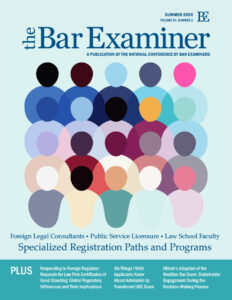This article originally appeared in The Bar Examiner print edition, Winter 2022–2023 (Vol. 91, No. 4), pp. 15–17.By Sherry M. Hieber

Each year, tens of thousands of examinees take the bar exam for the first time. Understandably, they are apprehensive about the process—reaching this stage is the culmination of years of hard work and a pivotal point in their journey to join the legal profession. During my tenure at the New Hampshire Supreme Court Office of Bar Admissions, I have seen some common misunderstandings and missteps among new examinees that have unnecessarily complicated this process.
In this article, I draw from my experience and share what I wish all applicants knew about the bar admissions process. What follows is what I try to convey to them to help them approach the process in a positive and proactive way. Because I work in a smaller jurisdiction, I have asked my colleagues from larger jurisdictions to share their thoughts, which are included below.
1. We are delighted to be a part of your journey.
Most applicants to the bar are recent law school graduates who sit for the bar exam. We enter your lives at an incredible time of transition. Many of you are leaving formal schooling for the first time and are entering a career that you have chosen and worked hard to achieve. We respect that achievement and your journey. Many of us are lawyers and have our own memories of the bar admissions process. We want you to succeed in becoming a lawyer.
2. We view the admissions process through the lens of professionalism that is expected of admitted attorneys.
You are becoming a member of a profession governed by rules of professional conduct and by the norms of our jurisdictions’ courts. Many states have professionalism creeds that are aspirational and refer to qualities such as courtesy, diligence, responsibility, candor, and respect. We seek to ensure that your approach to the admissions process reflects these qualities. Consider your application to the bar the first opportunity to demonstrate your commitment to professionalism in your future practice.
3. We understand your path to law school may not have been a straight line.
The key to the character and fitness evaluation is current character and fitness. From our perspective, we think, who is this person before us now and how did you get here? Past misconduct is likely not the deciding factor on fitness to be a lawyer. But do you have the character to honestly share your life experience, both your highs and your lows, and give us a candid assessment of what you did and what you learned from it? If you have serious misconduct in your past, we will look for evidence of rehabilitation. When addressing these issues, sincerity and self-reflection go a lot farther than bluster and avoidance.
4. You should review the application forms and the rules and regulations related to admission early in the process.
The bar application asks for relatively detailed information about your background. You may have to provide documents to fully answer these questions. Looking at the application as early as you can is imperative. This includes the forms that are necessary for test accommodations, which often require supporting documentation. In addition, your jurisdiction may have written standards that govern evaluation of applicants’ character and fitness.
In New Hampshire, Supreme Court Rule 42B sets forth these standards and, as an example, contains a standard on financial responsibility. The standard states that being in debt or unable to stay current with debt is not in itself disqualifying. However, the Committee on Character and Fitness, which conducts investigations and makes recommendations to the Supreme Court regarding the character and fitness of those applying to become members of the New Hampshire bar, expects applicants with debt to keep each creditor informed of a current address and to make reasonable efforts to work out settlements and/or repayment plans. Knowing this standard well in advance of submitting your application will allow you to resolve issues before you apply.
5. Meet our deadlines.
Jurisdictions set deadlines needed to ensure a smooth administrative process. In most instances, the deadlines are not flexible, and a failure to submit documents by the deadlines could have serious consequences, including delay of your application or disqualification to sit for the bar exam. If you have an emergency, contact the bar admissions authority prior to the deadline to discuss the problem and see whether it can be resolved.
6. Try to find needed information on our website, but if you need further help, contact us.
We want to be helpful, and many questions can be resolved quickly, so contact us if you cannot find an answer on our website. But please look first. We would love to discuss anything that concerns you, but contacting us to ask, for instance, how to apply to take the bar exam is not a productive use of your time or ours.
7. We expect you to read thoroughly the instructions and requests for information from our office.
Attention to detail is critical. The highest ideals of professionalism demand that lawyers pay attention to the accuracy of details in matters with which they are entrusted. That approach should govern all your written and verbal communication with our office, as well as your following instructions for exam day.
8. Communicate with us with diligence, candor, and honesty.
As a part of the review process, we may follow up with you seeking additional information and further documentation. Be diligent about responding, and be polite. Be candid and direct in your responses. Especially, avoid sarcasm, cynicism, hyperbole, and exaggeration. We have a process that we are required to complete. You may think that the information is irrelevant to your character, but we have an obligation, established by the Court, to gather the information that we believe is necessary to make an assessment.
9. Make sure that your bar application is consistent with the disclosures you made on your law school application, and err on the side of disclosure.
Inconsistent disclosures will bring into question your current character and fitness. Let’s say that you were disciplined for underage drinking in your college dorm. You disclosed this to your law school, but you find out that the college destroys records after graduation, so there is no record of the discipline. Our advice is to disclose, disclose, disclose. No one will be kept out of the bar for underage drinking in college. But when you affirm that you had no disciplinary record, and we discover it, your current character and fitness becomes an issue. Keep in mind that this also pertains to expunged criminal records.
10. Update your application in a timely manner.
The rules obligate applicants to update their applications with significant changes during the entire pendency of the application process.
11. Most of you will pass the character and fitness process with no issues.
Most applicants have no character and fitness issues of concern to the committees and boards that review applications. In general, no news is good news; minor issues, although still required to be disclosed, rarely pose problems.
12. Do not let the fact that you are applying to the bar stop you from seeking counseling or treatment.
Bar admission authorities are acutely aware of the stress and pressure you face as a law student. Some law students experience significant life events during their studies that impact their physical or mental health and wellness. We want you to seek treatment or counseling to assist you in managing these issues, and be assured that doing so will not negatively impact your ability to become a member of the bar.
I hope this gives you some guidance as you work toward becoming a lawyer, and I wish you the best in this process and in your career.

Sherry M. Hieber is General Counsel for the New Hampshire Supreme Court Office of Bar Admissions.
Contact us to request a pdf file of the original article as it appeared in the print edition.







